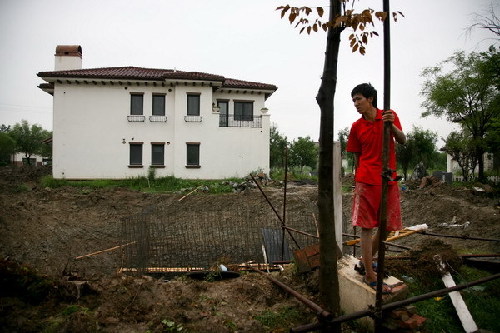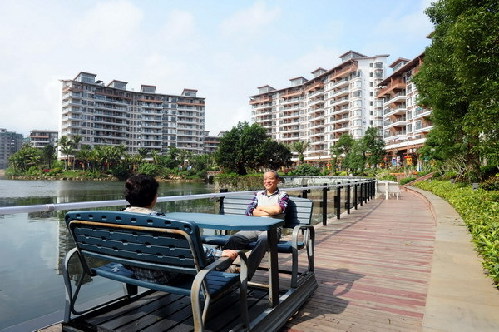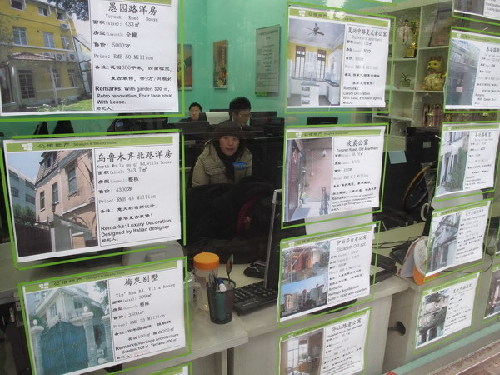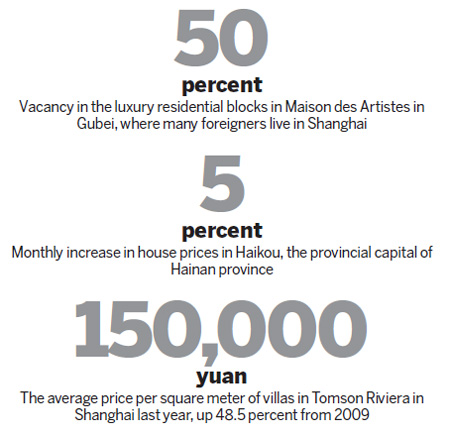|
|

This unoccupied house is in the Jingjin New District in Tianjin, which is said by its developers to be Asia's largest luxury villa compound. It has a vacancy rate of 90 percent seven years after it was built. (File photo, August 2010) [Photo/for China Daily] | Despite high vacancy rates and concerns over property tax, prices continue to tempt buyers looking for a good return on their expenditure, Yu Ran reports in Shanghai.
Dong Zhenxing was pondering what to do with the villa he has owned for more than two years but has never lived in.
The two-story property in Anting New Town in Shanghai's Jiading district sits next to the Shanghai International Circuit, home to the Formula One Chinese Grand Prix, and has been empty since he bought it in 2008.
"I'm not like those housing speculators," said Dong, a trading company owner who exports electronic appliances manufactured in Kunshan, Jiangsu province, and whose annual income is about 10 million yuan ($1.52 million).
"I don't think I will buy another villa for the moment because a trial property tax is being brought in and you have to spend too long waiting for a good return on the investment."
Finally, the 55-year-old shrugged and announced he would decorate the two-story villa and move his family in next year if prices don't rise enough to yield what he regards as a healthy profit.
Dong is not alone in sitting on an empty property and wondering what government policies might do to its value.
Villas have become especially attractive to speculators who have become used to making a quick buck from a market that seemed to be forever on an upward trajectory.
The authorities see things differently. They are more keen on ensuring the stability and affordability of house prices.
The central government announced in September it would impose a trial property tax in some cities, and the taxes went into effect Jan 28 in Shanghai and Chongqing. And Beijing on Wednesday announced rules that include a limit of two properties for people with city residence permits, and one property for eligible non-locals.
China's real estate market remains overheated, even after a slew of tightening measures last year, including higher down payments, higher lending rates for second-home buyers and two increases in the benchmark lending rate.
Chongqing will tax all villas as well as new apartments that cost at least twice the average price of all newly built homes in the southwestern city.
All newly bought additional homes of permanent residents in Shanghai will be taxed if the average floor space for each family member in all the properties added together is more than 60 square meters, the Shanghai municipal government said.
All new homes bought by non-permanent residents will also be taxed, but the buyers can get the money back for their first new homes after they have lived and worked in Shanghai for three years.
"The levy is designed to help regulate the property market and to keep house purchases at a reasonable level," said Shao Minghao, head of research at Shanghai Hanyu Property Consulting Co Ltd. "It will definitely affect the villa market eventually."
Shao said fewer villas will be sold because they tend to be more expensive than apartments and therefore will attract more tax. As a result, a real estate bubble might be averted.
The authorities determine whether a home is vacant by measuring how much electricity and water are used. It is very difficult to define and calculate vacancy rates because many are inhabited only on weekends or during holidays, said Yang Hongxu, a senior researcher at E-House China Research and Development Institute in Shanghai.
|

The value of signed agreements at the Boao Citic-Qian Zhou Bay project in Hainan province totaled 100 million yuan ($15.2 million) within a week after the 26 villas went on sale to the public. [Photo/for China Daily] |
Open and empty
In a healthy market, average vacancy rates range from 5 to 10 percent. This maintains a balance between supply and demand. However, there are strong signs that all is not well with parts of China's property market.
In the Chaoyang district of Beijing, villas and luxury apartments accounted for 55 percent of the apartments and houses that had been empty for three years or longer, according to a report published by the district government in August.
Among the many newly constructed projects, the Jingjin New District is said by its developers to be Asia's largest luxury villa compound. Situated in a suburb of Tianjin, a metropolis 120 kilometers (75 miles) southeast of Beijing, the district has a vacancy rate of 90 percent seven years after it was built, according to a report of the China National Radio.
"The main reason for the high vacancy rate of villas is that the owners bought them to use as weekend and holiday accommodation while living in the city during the week," said Qin Feng, manager of the Shimao Riviera Garden branch of Centaline Property, one of the top property agencies in Shanghai. Qin added that despite buying weekend retreats, many owners never got around to making use of them.
Fortune Residence is one of the most expensive residential neighborhoods in Shanghai. The average price for a luxury apartment overlooking Huangpu River is about 120,000 yuan ($18,253) a square meter. It has a 50 percent vacancy rate on properties worth at least 20 million yuan.
A similar situation can be found in the Hongqiao area, including Gubei. This was the first part of Shanghai where land was made available for foreigners and estate developers. Most villa developments in Hongqiao have good occupancy rates but the global financial crisis had a particularly strong effect on Gubei apartments, where many tenants were in middle management. They found they were often first in the firing line and left Shanghai en masse over the past two years. They are only now beginning to return.
Despite the high vacancy rates, prices have continued to rise.
"The lowest price for villas in Shanghai is expected to increase from 50,000 yuan to 100,000 yuan a square meter within two years," said Yang, the E-House researcher.
|

Housing information is posted all over a glass window of the Gongheng real estate company on Anfu Road in Shanghai. [Photo/China Daily] |
Worth the wait?
Yang said the high vacancy rate for villas lay in the fact that vast profits could be made just by leaving them empty. In some cases, prices have doubled or even tripled.
"Certain real estate investors pay more attention to the villa market because the return rate is much higher than an apartment, although the vacancy rate is almost twice as high," Yang said.
Owning property in China is regarded as a sign of success. It shows the owner is family-oriented and able to handle challenging financial problems. Home ownership has become the ultimate symbol of virility and status in China today, say social observers.
The chronic vacancy rates for villas in China is unlikely to end soon because those rich enough to afford them are rich enough not to have to live in them and quite happy to stand by as they go up in value.
"In the West, most property owners rent out homes they don't live in. Chinese owners don't care that their properties are vacant because they have found it easy to resell the property for a higher price as the market boomed," said Zhang Kunyu, an investment consultant with Centaline Property in Beijing.
Zhang said the market for villas was more stable than more ordinary housing because it was open only to the very rich, who are less likely to be affected by changing government policies regarding property.
Many who invest in it have thriving businesses that keep them fully occupied, so they don't have time to enjoy living in their new homes. One such person is Wang Sheng, a Wenzhou merchant who owns an export company in Dongguan.
"I plan to live in my villa in Hangzhou after I retire because I consider Hangzhou to be the city with the best standard of living. However, until then, I won't have any time to decorate my villa and prepare to move in," he said.

Hedge for wealthy
The government reduced the amount of land that could be used to build villas in 2006. This promptly made investors realize the buildings were, in effect, limited editions and could command a premium price. The restriction imposed by the Ministry of Land and Resources prevented any property developer from building single villa projects.
According to the regulation, a villa is defined as a house in which there is less than 0.6 of a floor-area ratio. (For example, if the land occupied 100,000 square meters, the floor area of the building must be less than 60,000 square meters.)
Some property developers spotted a loophole that, if exploited, could yield bigger profits. They built two adjoining villas with a floor-area ratio higher than 0.6 and then knocked them into one after selling them to a client.
The villa market has proved to be a hedge against financial downturn.
"After the huge depression in the real estate market caused by the financial crisis in 2008, the villa market in Beijing recovered within two years," Zhang said.
According to statistics on Beijing Real Estate Transaction Management's website, more than half of 120 villa projects for sale were sold in March 2009, an increase of 320 percent in one month.
He Fangxi, a sales manager at a real estate agency in Beijng, said that inflation has affected decision-making regarding high-end property among wealthy investors who have started to worry about depreciation of the currency.
For example, an apartment in Sanya, in Hainan, that sold for 140,000 yuan in 2005 is now worth 480,000 yuan or more. Average house prices there are equivalent to those in major cities such as Beijing and Shanghai. In Haikou, the provincial capital, the monthly rise in house prices has reached 5 percent.
Although house prices are rising by about 1,000 yuan a square meter every day, people are buying them as casually as if they were picking up tomatoes in the supermarket, said Chen Tianshan, a local real estate developer.
"The price potential of luxurious villas in Hainan hasn't been discovered yet because construction across the whole island is still under way," Chen said. "Therefore, the value of properties in Hainan, especially in Sanya, will continue to rise."
|

